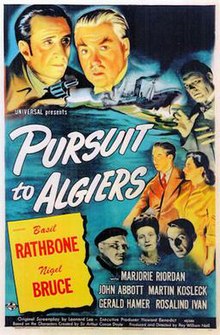Pursuit to Algiers
This article relies largely or entirely on a single source. (September 2018) |
| Pursuit to Algiers | |
|---|---|
 1946 US theatrical poster | |
| Directed by | Roy William Neill |
| Screenplay by | Leonard Lee |
| Based on | Characters by Sir Arthur Conan Doyle |
| Produced by | Howard Benedict |
| Starring | Basil Rathbone Nigel Bruce |
| Cinematography | Paul Ivano |
| Edited by | Saul A. Goodkind |
| Music by | Edgar Fairchild |
| Distributed by | Universal Studios |
Release date |
|
Running time | 65 minutes |
| Country | United States |
| Language | English |
Pursuit to Algiers (1945) is the twelfth entry in the Basil Rathbone/Nigel Bruce Sherlock Holmes film series of fourteen. The film takes some characters and events from the 1911 story "The Adventure of the Red Circle". Elements in the story pay homage to an otherwise unrecorded affair mentioned by Dr. Watson at the beginning of the 1903 story "The Adventure of the Norwood Builder", notably the steamship Friesland. Off-camera, Watson also recounts to his audience another unrecorded affair mentioned in the 1924 story "The Adventure of the Sussex Vampire", that of the Giant Rat of Sumatra, "a story for which the world is not yet prepared".
Plot
About to leave London for a much-needed vacation, Holmes and Watson receive a cryptic invitation. Intrigued, Holmes accepts and is met by the prime minister (Frederick Worlock) of the fictional country of Rovinia, who begs him to escort Prince Nikolas (Leslie Vincent) home. It turns out that his father has been assassinated, and Nikolas is the heir. Holmes agrees.
Arrangements have already been made for an airplane. When it develops problems, a smaller replacement only has room for the prince and Holmes, leaving Watson behind. When Watson protests, Holmes suggests he follow on a passenger ship bound for Algiers.
On the voyage, Watson reads that the airplane has crashed in the Pyrenees and that it is unlikely that there are any survivors. Holmes has an aversion to plans made by others and is aboard the ship with Nikolas. He instructs Watson to introduce the prince to the other passengers as his nephew. Though Watson suspects everyone, from American singer Sheila Woodbury (Marjorie Riordan) to exercise fanatic Agatha Dunham (Rosalind Ivan) to a secretive pair who later turn out to be archeologists, of being killers, it is not until the ship makes an unscheduled stop at Lisbon that the real Russian agents come aboard: Gregor (Rex Evans), circus knife thrower Mirko (Martin Kosleck), and a hulking mute named Gubec (William 'Wee Willie' Davis).
First, Mirko tries to kill Holmes with a knife thrown through a porthole, then Gregor substitutes an explosive party favor, but Holmes foils both attempts. Finally, the villains succeed in kidnapping the prince when they dock at Algiers, only for Holmes to reveal that the "prince" was a decoy; the real prince had been posing as a steward, hidden in plain sight the whole time. The decoy prince is later recovered unharmed.[1]
Cast
- Basil Rathbone as Sherlock Holmes
- Nigel Bruce as Dr. Watson
- Marjorie Riordan as Sheila Woodbury
- Rosalind Ivan as Agatha Dunham
- Morton Lowry as Steward
- Leslie Vincent as Prince Nikolas, aka "Nikolas Watson"
- Martin Kosleck as Mirko
- Rex Evans as Gregor
- John Abbott as Jodri
- Gerald Hamer as Kingston
- William 'Wee Willie' Davis as Gubec
- Tom Dillon as Restaurant Owner
- Frederick Worlock as Prime Minister
- Sven Hugo Borg as Johansson
Critical Assessment
Universal Studios film director Roy Neill delivers a tongue-in-check version of the Sherlock Holmes film genre in Pursuit to Algiers in which even the actors “seem aware they are trapped within a genre picture.”
“His interminable success: could he not fail just once and prove himself a human being!" - Actor Basil Rathbone on the cinematic rendition of Sherlock Holmes[2]
This “camp” portrayal of the famous detective exaggerates every virtue of Conan Doyle’s literary creation, with Neill and Rathbone issuing a burlesque reveling in Holmes unerring expertise in everything” ranging from the “Moorish architecture of Lisbon” to "recognizing a knife-thrower glimpsed at an obscure Parisian circus” and perfectly identifying “suspicious foreigners” based on their “gravely flawed fashion sense.”[3]
Footnotes
- ^ Davies, David Stuart, Holmes of the Movies (New English Library, 1976) ISBN 0-450-03358-9
- ^ Schwartzman, 2004: Schwartzman quoting from Rathbone’s autobiography.
- ^ Schwartzman, 2004: Compared to Murder By Death, “an irreverent homage to Agatha Christie...”
References
- Schwartzman, Theresa. 2004. Pursuit to Algiers, 1945. UCLA Film and Television Archive: 12th Festival of Preservation, July 22-August 21, 2004. Festival guest publication.
